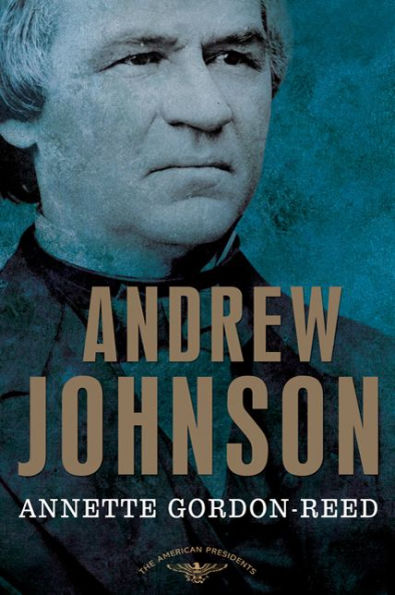“This is a country for white men, and by God, as long as I am President, it shall be a government for white men.”
Andrew Johnson
Annette Gordon-Reed needs you to understand something. Andrew Johnson, routinely ranked among the worst 2-3 Presidents of all time, earned his ignominious reputation honestly. Via a combination of epic stubbornness, life-long racism and a leniency towards the Confederacy that would make NASCAR fans blush, the 17th president is taken to task by the Harvard history professor in no uncertain terms. I was going to say he kind of looks like Tommy Lee Jones with Javier Bardem’s haircut from No Country for Old Men, but she makes a much more cogent case.
People like to say that these days we are more divided than ever. It was that sentiment that got me off and running on this quest in the first place. I didn’t buy it. After reading about Andrew Johnson, I’m fairly convinced that I had the right idea. I’ll grant we may be as divided as ever, but the echoes of the first president to be impeached ring eerily similar to the most recent one. Let’s taste a sampler platter of moments from the Johnson years. You tell me if they sound so far off a certain infamous Twitter feed:
- Once said the threat to the Union was the North, not the South, since the former wanted to end slavery which, he argued, was a positive good that raised wages for working-class whites.
- “Slavery itself has its foundation, and will find its perpetuity in the Union, and the Union its continuance by a non-interference with the institution of slavery.”
- Once said to a group of blacks visiting the White House that he believed the planter elite and their slaves had been co-conspirators in a plot to oppress poor white people.
- Threatened to argue his impeachment case in person “if his defense was not conducted according to his own ideas” but ultimately let it play out without his personal input. (Note: he was not a lawyer and had no formal education.)
- Realizing he wouldn’t get either major party’s nomination, he tried to form the National Union Party, hoping to tie together everyone not in line with Reconstruction and the 14th Amendment. He hoped it “would return the country to the values of the Founders.”
- Johnson used his final State of the Union Address as a glorified pity party to air his now-common grievances: Congress handling Reconstruction (rather than the president) violated the Constitution; radicals were working to “place the white population under the dominion of persons of color in the South”; the Tenure of Office Act [the one that got him impeached] was total bullshit. Etc. Etc.
Hold on. THIS was Abraham Lincoln’s vice president?! What!? The long history of horrible VP choices continued, but Johnson was actually Abe’s second vice president. In his first term he rode with Hannibal Hamlin of Maine. But as the Civil War wound down and a Union victory seemed assured, Lincoln took pains to extend olive branches to the defeated South. One of his decisions – arguably his most consequential – was to drop Hamlin and add a Southerner to the 1864 ticket. Johnson had (surprisingly, in retrospect) stayed fiercely loyal to the Union, making speeches in favor of it around his adopted Tennessee, always at considerable risk to his life. He was the only senator to remain in session from a state that seceded. He got the nod, and history collectively sighed.
Andrew Johnson is hard to study due to the paucity of personal writings. Illiterate well into his 20s, he was not comfortable writing until after his 30th birthday and even then didn’t do it much. In his first bid for the Tennessee state legislature, Johnson went up against popular and powerful opponents. While in every way the inferior in education and breeding, he relied on his ability to light ’em up at the debate stand. As Gordon-Reed notes, “He crushed his rivals in their first public debate, employing a take-no-prisoners style that would become his trademark. His talent for invective and savage ridicule apparently disoriented his opponents. They simply did not know how to respond to him.” If he was trying to emulate executives of the American past, it seems Trump had the wrong Andrew on his office wall.
Reconstruction is where Johnson really gets annihilated by historians. He tried to force through his ideas, which included complete amnesty for the South, lots of pardons and a general plea of, “No no no, they never left the Union! There’s nothing to see here!” He tried continually to wrest the process of Reconstruction from Congress, much to the outrage of the lawmakers, who wanted to be the main drivers of reuniting the fractured country. In 1866, Johnson vetoed both the Freedman’s Bureau Bill and the Civil Rights Bill. Both vetoes were overridden. This was the same year as his “swing around the circle” campaign which included, among many other lowlights of slander and invective, calling for the lynching of a sitting member of the House of Representatives who was an abolitionist.
Unsurprisingly, this soured Congressmen on both sides of the aisle on the Commander-in-Chief. Also lacking surprise, Andrew Johnson became the first president to be impeached (though he was acquitted in the Senate by just one vote and stayed in office). Gordon-Reed notes that most historians agree that the impeachment articles put forward don’t really stand up as high crimes and misdemeanors, but this just gives credence to the idea that so many people in Congress hated Johnson’s guts that they found a round about way to try to throw him out of office. Even though he kept his job, he lost his party and with it, any hope of election in his own right.
Johnson stood at the doorstep of history, tripped over it and fell on his face in the mud. It would have been near impossible to follow Lincoln in any case, but Johnson’s great failing is that he could have reincorporated the South while giving blacks a generational boost. All he had to do was extend to them the same provisions he himself had given poor whites and not antagonized a Congress looking to mend the nation. He could have helped stitch together a broken country, but instead he insisted on maintaining, so far as he lawfully could, the same racial divisions that had so recently driven the country to war. You convinced me, Professor. Andrew Johnson was one of the all-time worst.
Trivia
- First president to be impeached
- Got HAMMERED right before his inauguration and gave possibly the most embarrassing swearing in speech of all time. He took shots in Hannibal Hamlin’s office, leading some to speculate that the possibly jaded outgoing VP got Johnson liquored up to make him look like a fool.
- Grew up in poverty, father died when he was young and Johnson was sold as an apprentice in a tailor shop at 10 years old with a contract to remain until he turned 21. (He ran away early)
- He got gerrymandered out of office! Whigs in the Tennessee legislature redrew his district to force him out of the state House.
- Bought his first slaves in 1841, 14-year old Dolly and her half-brother Sam. Rumors went round that he sired a few children by Dolly given the children’s light complexation and Johnson’s affection for them.
Follow-up Reading
- Impeached: The Trial of Andrew Johnson and the Fight for Lincoln’s Legacy by David Stewart
- The Avenger Takes His Place: Andrew Johnson and the 45 Days that Changed the Nation by Howard Means
- Black Reconstruction in America by WEB DuBois


1 thought on “From First to Worst”
Pingback: Good Looks, a Bad Ticker and a Teapot Full Of Scandal – Library Card Life